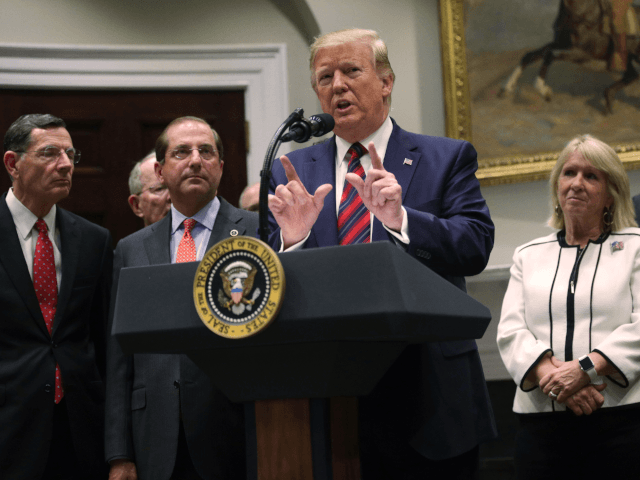President Donald Trump plans to tackle price transparency as well as regional health insurance and hospital monopolies as part of a broader strategy on revitalizing American health care.
Trump plans to unveil and sign an executive order as soon as this week that would require healthcare companies to disclose their prices. The move follows a new Health and Human Services (HHS) Department rule requiring that drug companies disclose their products’ prices on their television ads.
The Trump administration reportedly will also look at using agencies such as the Justice Department to tackle regional monopolies of hospitals and health insurance plans over concerns that their market concentration in the healthcare markets drive up costs.
Trump’s reported actions to tackle America’s rising healthcare cost arise as Trump said that he will unveil his “great healthcare plan” in June; the president has promised that the Republican party will become the party of health care. Trump tapped Sens. John Barrasso (R-WY), Bill Cassidy (R-LA), and Rick Scott (R-LA) to develop a comprehensive healthcare plan.
Critics of the current healthcare system contend that the industry’s secretive pricing practices help benefit the industry at the patients’ expense and often causes discrepancies in the same service costs across the country.
A recent RAND Corporation study found that private insurance plans pay hospitals, on average, 241 percent more than what Medicare pays for the same services; however, hospitals often contend that they lose money on Medicare patients due to the low reimbursement rate, therefore, they have to charge private insurance enrollees to make up for Medicare patients.
Other studies found that the health insurance industry, as well as the hospital industry, have become increasingly concentrated.
The Government Accountability Office (GAO) released a study in March which found that the three largest health insurance companies dominate the large group market (covering employer-sponsored health insurance), small group market (covering small businesses), and the individual market.
The GAO found that the three largest issuers control 80 percent of the market or more in at least 37 of 51 states; the GAO found similar results from 2011 to 2014, though it would appear that the health insurance market has become more concentrated since Obamacare became law.
Hospital mergers have accelerated since Obamacare became law and the University of California found that since Obamacare’s passage, the percentage of doctors employed by hospitals increased from 27.7 percent in 2010 to 43.5 percent in 2016, meaning that a plurality of American physicians work for hospitals, rather than for medical groups or independent practice.
As Trump and Republicans move closer to the 2020 presidential election, Sen. Mike Braun (R-IN), who has led the way on healthcare reform, said that Republicans need to “force the conversation” of healthcare reform onto the industry’s back. Braun said that if the healthcare industry does not change, then Medicare for All will win.
Braun explained:
I actually put more of the burden and blame for the issues we’ve had with health care at the industry. They’re the ones that ought to be smart enough to know they got to get with it or they will have one partner only, and that’s the federal government. So, my mantra [for his business] has been ‘never go broke because you get sick or have a bad accident,’ incorporate that into everything you do.
“The industry can fix it if they get with it. The federal government is just going to be the tool of the Democrats that try to move to Medicare for All,” Braun said.
Sean Moran is a congressional reporter for Breitbart News. Follow him on Twitter @SeanMoran3.

COMMENTS
Please let us know if you're having issues with commenting.